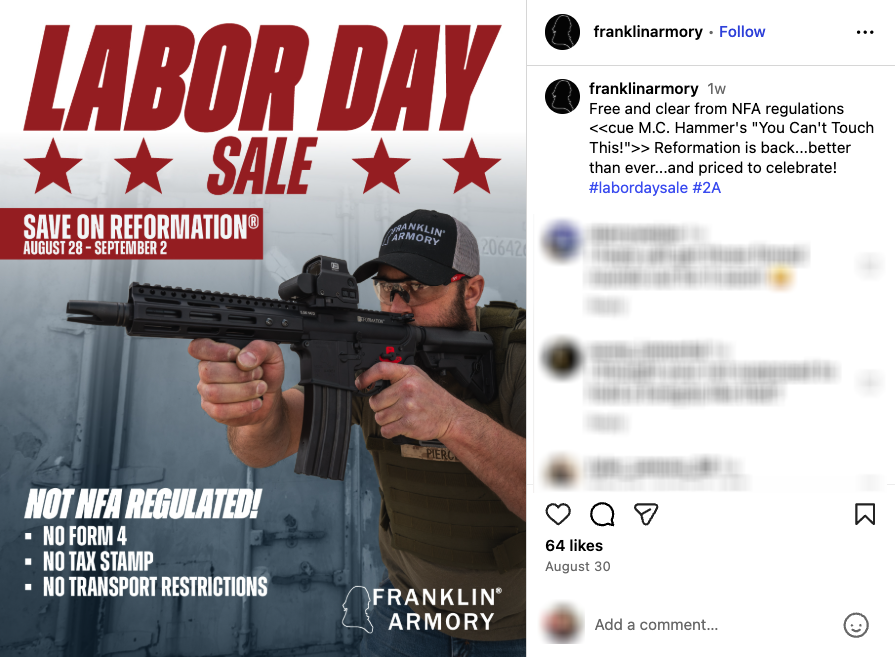On August 29, 2025, the Bureau of Alcohol, Tobacco, Firearms and Explosives (ATF) issued an open letter to all gun makers and dealers stating that the agency had reclassified Franklin Armory’s Reformation and Antithesis — shown below — as standard “firearms” that are no longer subject to enhanced federal oversight, making them easier to own.
For years, the ATF had held that the AR-style weapons were subject to National Firearms Act (NFA) and Gun Control Act (GCA) restrictions due to their short barrels and easy concealability. Franklin Armory sued the ATF over its classifications, and in February, U.S. District Judge Daniel M. Traynor, a Trump appointee, ruled that the agency had overstepped its authority. The Department of Justice had appealed that decision, but then, in July, abruptly reversed course and dropped its appeal after entering into a settlement agreement with Franklin Armory.
Trump settles for the gun industry
The settlement agreement cites President Trump’s February 7 “Protecting Second Amendment Rights” executive order as the justification for the reversal — and this is the second time the Trump administration has used this settlement strategy to undercut federal gun laws that have protected communities for decades.
In May, the Department of Justice pointed to the same executive order when it settled with Rare Breed Triggers, permitting the company to once again sell forced-reset triggers that allow AR-15s and other semi-automatic firearms to fire like NFA-regulated machine guns.
It is also noteworthy that the Trump administration made the AR-style Reformation and Antithesis easier to own less than 48 hours after a mass shooter used an AR-15 and multiple high-capacity magazines to kill two students and wound 21 others, including 18 children, at Annunciation Catholic School in Minneapolis.
Exploiting loopholes
Franklin Armory of Minden, Nevada, which calls its workers “Facilitators of Freedom,” has carved a niche for itself in the gun industry by specializing in weapons and devices that exploit loopholes in federal regulations. For example, along with a range of AR-15s, the company produces binary triggers that effectively double a semi-automatic firearm’s rate of fire but have not been classified as “machine guns” by the ATF.
The Reformation and Antithesis were also designed to defy classification. Federal law defines “rifles” and “shotguns” as shoulder-fired weapons with rifled and smoothbore barrels, respectively. And since 1934, the NFA has imposed strict registration requirements on those with barrels shorter than 16 or 18 inches because they are easy to hide under a coat or in a backpack, for example. (The law also imposed $200 taxes for making or building such weapons, but Trump’s “One Big Beautiful Bill” rescinded that requirement.)
At first glance, the Reformation, sold with either a 7.5- or 11-inch barrel, would appear to be a short-barreled rifle subject to the NFA. But the interior of the barrel uses straight lands and grooves to stabilize bullets — as opposed to conventional spiral-cut rifling — and evades classification as a “rifle.” Instead of firing typical rifle bullets, the Reformation fires special bullets with tail fins. The ammunition limits the gun’s effective range, but Franklin Armory markets it as the “ultimate home defense weapon.”

In 2019, the ATF ruled that the Reformation was instead a short-barreled shotgun because the straight lands and grooves amounted to a “smoothbore.” In response, Franklin Armory partnered with the Firearms Regulatory Accountability Coalition (FRAC) to sue the ATF. The FRAC has worked with several gun companies to challenge the ATF’s arm brace rule and submit amicus briefs in opposition to the agency’s bump stock and ghost gun rules.
The Antithesis is a prototype AR-15 that Franklin Armory designed with a rifled 14.5-inch barrel that could fire both .410 shotgun shells and .45 Colt cartridges commonly used in revolvers and lever-action rifles. The company argued that it did not meet the federal definition for a “short-barreled rifle” because it can fire multiple shotgun pellets — and not just “a single projectile” — per trigger pull. The ATF ruled otherwise. In a 2021 classification letter, the agency noted that the gun’s barrel rifling actually hindered its effectiveness with shotgun pellets and proves that the gun was instead “designed and made” to fire single projectiles at a time.

franklin armory celebrates
After Judge Traynor’s ruling in February, Franklin Armory announced that the Reformation would soon be available to customers — with or without binary triggers installed. The company also published a video showing a man firing bursts with a binary-trigger-equipped Reformation.


In response to the ATF’s more recent open letter, Franklin Armory and the FRAC issued a joint statement thanking “the current leadership at both DOJ and ATF,” who “proved to have more respect for legal principles than their predecessors.”
The parties added, “We are grateful to Attorney General Bondi and ATF Acting Director Driscoll for recognizing the validity of our case and appreciate their combined efforts to negotiate an agreement. Settling this case not only rights a wrong perpetrated against a constitutionally-protected business seeking nothing more than to engage in lawful commerce, but also helps to reestablish integrity and trust between industry and executive branch institutions.”
The statement specifically focused on the Reformation, noting that the ATF’s open letter “means that consumers nationwide —at least in free states — will continue to have unfettered access to the ultimate home defense weapon for protection of self, family, and property, free and clear of all NFA restrictions.”